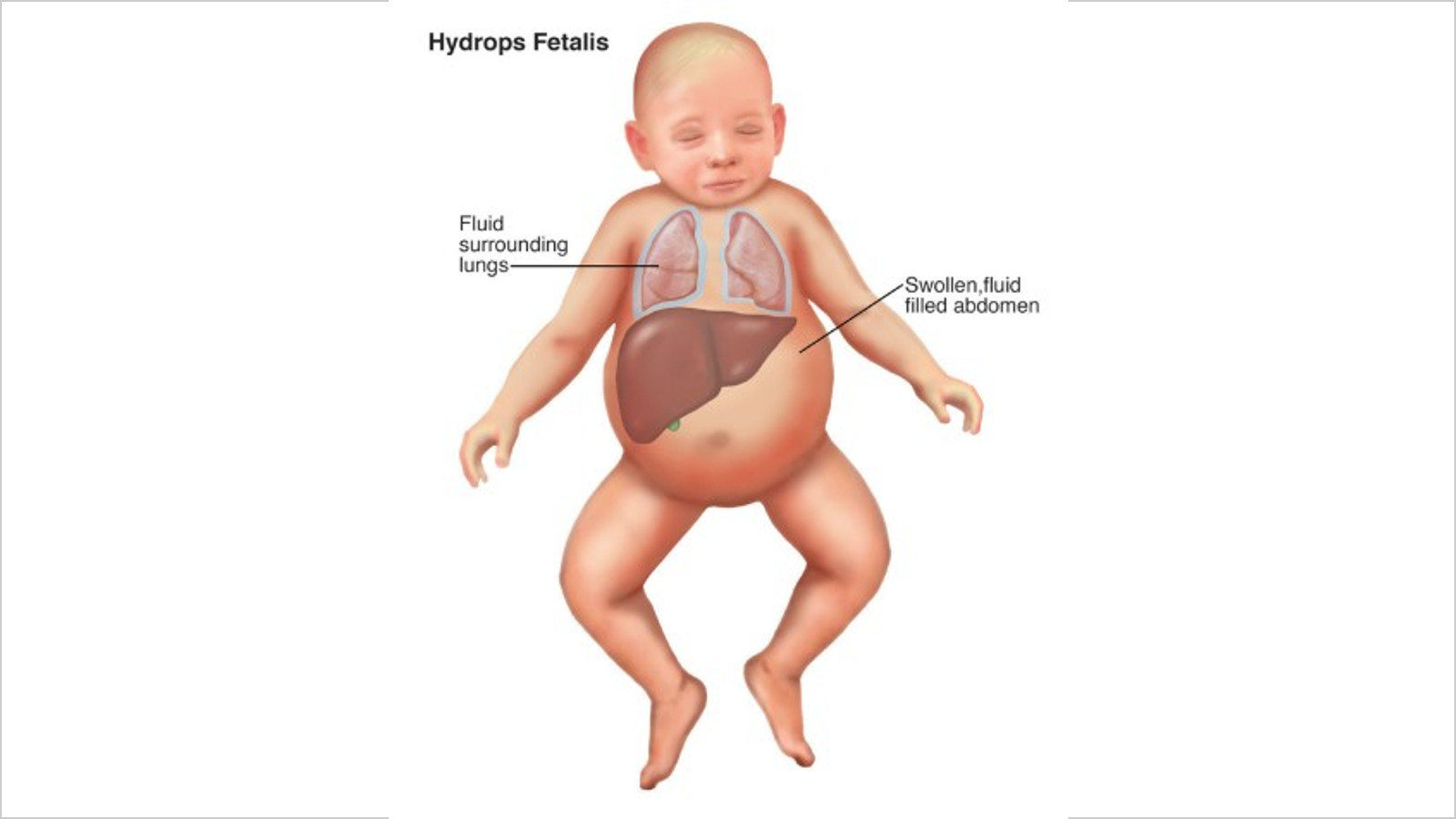Definition
Hydrops fetalis is a life-threatening condition characterized by severe swelling in a fetus or newborn. It is not a disease itself but usually a complication resulting from a medical condition that affects the regulation of fluid in the fetus or newborn.
The incidence of hydrops fetalis occurs in only 1 out of every 1,000 births.
Causes
There are two types of hydrops fetalis: immune and non-immune. The type depends on the underlying cause.
Immune Hydrops Fetalis
This type of hydrops is uncommon, but it can happen when there is rhesus incompatibility, which is when the mother's and fetus' blood types do not match. If the mother has Rh-negative blood and the fetus has Rh-positive blood, the mother's immune system will recognize the Rh-positive fetal blood as a foreign substance and produce antibodies to attack it. This leads to the destruction of many fetal red blood cells, causing anemia (a deficiency of red blood cells) in the baby.
Hydrops fetalis may develop in cases of severe Rh incompatibility, where the developing fetal organs are unable to cope with the anemia. The heart begins to fail, and a significant amount of fluid accumulates in the fetal tissues and organs. This type of hydrops is now rare because Rh-negative women are typically treated with Rh immunoglobulin (RhoGAM) to prevent this condition.
Non-Immune Hydrops
This type is now the most common, accounting for about 80–90% of all cases of hydrops fetalis. It includes all diseases or complications that can affect the way the fetus regulates fluid. Some diseases or conditions that can cause non-immune hydrops include:
- Severe anemia
- Hemoglobin abnormalities or other genetic diseases that lead to the destruction of fetal red blood cells
- Fetal hemorrhage
- Viral and bacterial infections during pregnancy, such as parvovirus B19 (erythema infectiosum), cytomegalovirus (CMV), toxoplasmosis, syphilis, and herpes
- Birth defects affecting heart function, such as heart defects or arrhythmias
- Liver disease
- Genetic and metabolic disorders, such as Turner syndrome, Down syndrome, and Gaucher disease
- Fetal vascular malformations
- Tumors compressing the heart or blocking blood flow to the heart
- Tumors with significant blood flow
- Identical twin pregnancies sharing a placenta
- Maternal abdominal hemorrhage, sometimes due to injury or accident
- In some cases, the cause of hydrops fetalis remains unknown
To learn more about the B19 parvovirus infection, click this link: Erythema Infectiosum (Fifth Disease) - Understanding, Causes, Symptoms, And Treatment.
Risk Factor
The risk factors for developing hydrops fetalis depend on its cause. For example, individuals of Asian and Mediterranean descent are at a higher risk for hydrops fetalis caused by hemoglobin abnormalities.
Symptoms
The symptoms of hydrops fetalis can vary slightly for each fetus or newborn. The most common signs and symptoms include:
During pregnancy
- Excess amniotic fluid (polyhydramnios)
- An abnormally thickened or enlarged placenta
- Ultrasound findings showing enlarged fetal liver, spleen, or heart and fluid accumulation around the abdomen, heart, or lungs
In newborns
- Pale skin
- Bruising on the skin
- Severe swelling throughout the body, particularly in the abdomen, around the heart or lungs, or under the skin
- Breathing difficulties
- Enlarged liver and spleen
- Severe jaundice
- Symptoms of hydrops may resemble other health conditions, depending on the underlying cause
Diagnosis
Ultrasound (USG)
Hydrops fetalis is almost always diagnosed during pregnancy or immediately after birth. It is usually diagnosed through an ultrasound (USG). Doctors can detect hydrops fetalis during routine prenatal ultrasound examinations.
Ultrasound uses high-energy sound waves to create images of blood vessels, tissues, and organs. Doctors use ultrasound to assess how the fetus's internal organs are functioning and to observe blood flow through various blood vessels.
Additional Diagnostic Tests
Other diagnostic tests may be conducted to help determine the severity or cause of hydrops fetalis. These tests may include:
- Fetal blood sampling, which involves inserting a needle through the uterus to access a fetal blood vessel or the umbilical cord
- Amniocentesis, a procedure that involves taking a sample of the amniotic fluid surrounding the fetus for examination
- Fetal echocardiography (ECG) to detect heart structure defects
Management
Before childbirth
The treatment and management of hydrops fetalis depend on its cause. During pregnancy, hydrops can only be treated in certain cases. Sometimes, doctors can provide a blood transfusion to the fetus in utero to help improve the chances of survival until birth.
In most cases, doctors will induce early labor to provide the best chance for the baby’s survival. This may be done with medications that induce early labor or through a cesarean section. The doctor will discuss these options with you.
A mother carrying a fetus with hydrops fetalis is at risk of developing a condition known as Ballantyne syndrome or mirror syndrome. Ballantyne syndrome can lead to life-threatening high blood pressure (hypertension) or seizures. If the mother develops mirror syndrome, the baby must be delivered as soon as possible.
After childbirth
Once the baby is born, treatments may include:
- Ventilator support for breathing difficulties, which can involve administering oxygen or using a breathing machine
- Thoracentesis, a procedure to remove excess fluid from the space around the lungs, heart, or abdomen using a needle
- Medications to manage heart failure
- Medications to help the kidneys remove excess fluid
For immune hydrops fetalis, the baby may receive a direct transfusion of red blood cells that match their blood type. If hydrops fetalis is caused by another underlying condition, the baby will also receive treatment for that condition. For example, antibiotics are used to treat syphilis infection.
Complications
The severe swelling that occurs in hydrops fetalis can impair the function of the fetus or baby's organs. Approximately 50% of fetuses with hydrops do not survive or die shortly before or after birth, even with treatment.
Only about 20% of fetuses diagnosed with hydrops fetalis before birth will survive to delivery, and among these, only half will survive after birth. The risk of mortality is highest for fetuses diagnosed in early pregnancy (less than 24 weeks of gestation) or babies with structural abnormalities, such as heart defects.
Other complications are also common in babies born with hydrops fetalis, including:
- Heart failure
- Brain damage
- Hypoglycemia (low blood sugar levels)
- Seizures
The prognosis largely depends on the underlying cause and treatment.
Prevention
Rhesus incompatibility can be prevented if the mother receives RhoGAM during and after pregnancy. However, preventing other causes of hydrops fetalis is more challenging.
When to See a Doctor?
It is recommended to attend regular prenatal check-ups to detect any potential problems during pregnancy, such as hydrops fetalis.
If you notice reduced fetal movements, seek medical attention immediately.
Looking for more information about other diseases? Click here!
- dr. Alvidiani Agustina Damanik
Hydrops fetalis. Stanford Medicine Children's Health - Lucile Packard Children's Hospital Stanford. Available at: https://www.stanfordchildrens.org/en/topic/default?id=hydrops-fetalis-90-P02374
Cafasso, J. (2018) Hydrops fetalis: Causes, outlook, treatment, symptoms, and more, Healthline. Healthline Media. Available at: https://www.healthline.com/health/hydrops-fetalis
What is hydrops fetalis and what causes it? (no date) Children's Minnesota. Available at: https://www.childrensmn.org/services/care-specialties-departments/fetal-medicine/conditions-and-services/hydrops-fetalis/










